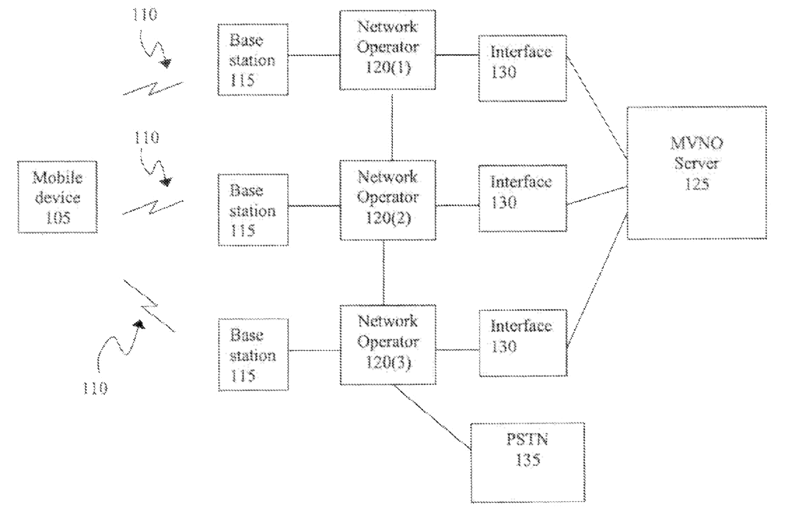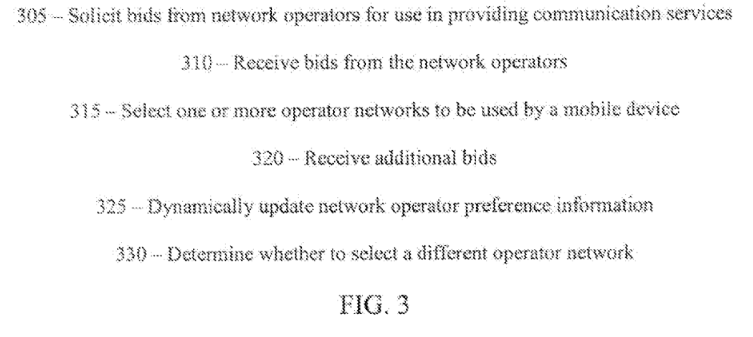In just three and a half years, Apple's iPhone has brought about substantial changes in the mobile phone industry and inspired a multitude of copycat devices. Now, just days before the iPhone goes multi-carrier in the US for the first time, AppleInsider has discovered a patent awarded to Apple that could further shake up the way carriers do business.
The patent, entitled "Dynamic carrier selection," describes a method for providing wireless communication services. According to the invention, a mobile device would store a network address and communicate with network operator servers. After receiving data from available network operators, the device or user would select a carrier. AppleInsider first reported on the patent in April 2008.
"In some situations, bids are received from multiple network operators for rates at which communication services using each network operator can be obtained. Preferences among the network operators are identified using the received bids, and the preferences are used to select the network operator for the mobile device to use in conducting communications," the filing noted.
The invention would allow Apple to run a MVNO system that could collect rate information from participating wireless networks within a region and automatically select or allow users to select the best option.
Traditional MVNOs purchase wireless minutes in bulk from existing carriers and resell them to customers. Apple's system could set off a bidding war between providers, potentially driving prices down.
The patent specifically lists Verizon and Sprint as examples of carriers from which MVNOs purchase minutes.
Using Apple's proposed system, a user could specify carrier preferences for different rates, locations and times that would then be dynamically selected by the iPhone.
An additional step that would likely enrage carriers would be for Apple to handle the accounting for the MVNO service and bill iPhone users through their iTunes account. Much like the controversial in-app subscriptions on the iPad, such a system would leave valuable user information in the hands of Apple, rather than the wireless carriers.
The application was filed in October 2006, nearly a year before the introduction of the iPhone. Former Apple executive Tony Fadell, known as the 'grandfather of the iPod,' is credited with the invention.
The patent serves as additional evidence that Apple has looked into ways to reduce its reliance on carrier relationships and provide iPhone users with more choices for wireless service.
Last October, reports emerged that Apple was working on a upgradeable flash-based SIM that could allow users to change wireless networks without having to obtain a carrier-specific SIM. Within weeks, several European carriers threatened Apple that such a feature would jeopardize their willingness to subsidize future versions of the iPhone.
Initial teardown reports of the Verizon iPhone 4 indicate that the smartphone uses a world mode MDM6600 Qualcomm baseband that could pave the way for a dual CDMA and GSM iPhone in the future.
 Josh Ong
Josh Ong





-xl-m.jpg)


-m.jpg)






 Malcolm Owen
Malcolm Owen
 William Gallagher
William Gallagher
 Mike Wuerthele
Mike Wuerthele


 Thomas Sibilly
Thomas Sibilly
 Wesley Hilliard
Wesley Hilliard
 Marko Zivkovic
Marko Zivkovic







84 Comments
What?\
Well this would be interesting! Companies in a bidding-war to provide you - the consumer- with services? I would love to be a fly on the wall when the telecom execs think about the ramifications of this one.
Wireless companies have been trying to branch away from being a provider of just the "pipe". I personally think they should stick to doing what they know best - providing wireless services - and stay away from the providing software services. They just do a horrible mess of it.
What?\
agreed..
Yes, I hope it happens very soon. You get your phone from Apple or any store, plug it to your computer and see the service prices side by side for comparison. And boom, you make your choice of whom becomes your carrier.
That will really be a hit with consumers. For the carriers? Who cares! They have ripped us off long enough.
Next we'll see this for Android and hear some Droidette claim Google was planning to do this all along.